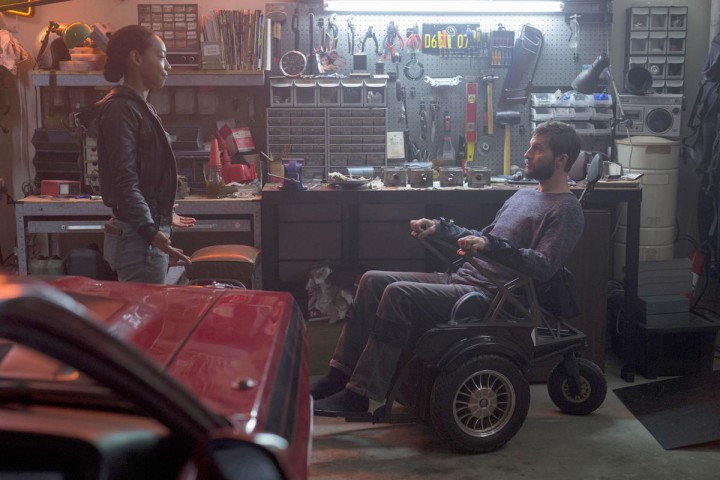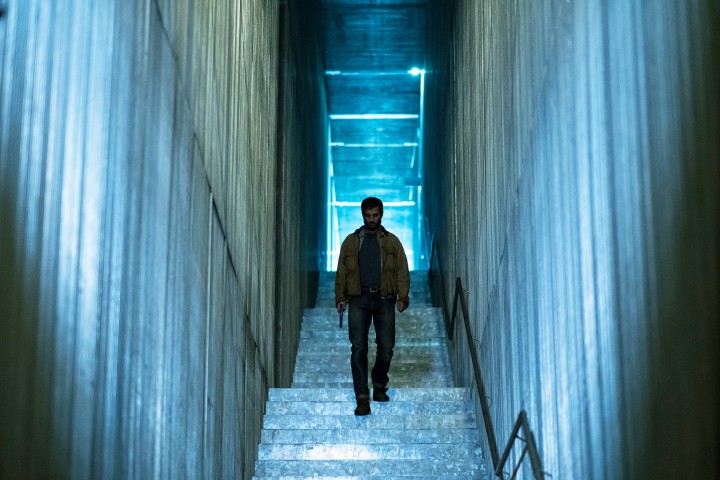Exploitation cinema ranks high on the not-for-everyone meter, but those who do go for grindhouse gore are in for an unexpected delight with Australian writer/director Leigh Whannell’s blood-spattered techno-thriller, Upgrade. While it falls definitively in the trash cinema category, Upgrade also has a little more on its mind than most movies of its ilk, and it gets these ideas across with a brutal efficiency that, while likely dictated by the financial constraints, also belies a clarity of vision and specificity of purpose. It’s far from high art, but it is a testament to what can be accomplished with a shoestring budget and a propensity for ultraviolence.
Best known as the writer, along with film school buddy James Wan, responsible for the creation of the inordinately profitable Saw and Insidious franchises, it should come as no surprise that Whannell’s directorial debut is defined largely by its gruesome sensibilities. What is somewhat more surprising in light of his pedigree is that Whannell eschews much — if not all — of the torture porn aesthetic that defined those earlier works in favor of making a more direct sociological statement.
Upgrade follows the improbably named Grey Trace (Logan Marshall-Green), a decidedly analog man in a digital dystopia. Trace is a wrench monkey repairing classic cars for wealthy clients while his doting wife, Asha (Melanie Vallejo), brings home the bacon working for a biotech firm that manufactures cybernetic implants. When his wife’s newfangled self-driving car strands the couple in a seedy slum, a brutal attack leaves her dead and him paralyzed from the neck down. Enter Eron Keen (Harrison Gilbertson), a tech mogul — and patron of Trace’s work in the form of a sweet Smokey and the Bandit Pontiac Firebird — to offer a devil’s bargain called STEM, a spinal implant that will allow Trace to walk again.
Speaking in Trace’s head with a voice that sounds like Siri and HAL-9000 sired a homicidal love child, STEM commandeers Trace’s body to kick copious amounts of ass in his quest to track down the villain responsible for his wife’s death, viciously murdering nigh-anonymous goons as he works his way to the top. This is where Upgrade shines, allowing Whannell to stage stylistically novel fight scenes and craft inventive set pieces while underscoring his themes of wealth disparity and perilous tech addiction. The film falls visually somewhere between RoboCop and Ex Machina, but the plot is The Road Warrior with some Death Wish thrown in for good measure.
As with any B-movie, Upgrade is not without its problems. Whannell’s stylistic flourishes frequently border on camp, its murdered-wife revenge narrative has a serious “fridging” problem, and it is severely deficient in the characterization department. Its cast of relative unknowns aren’t exactly bad, but they’re not great either — Gilbertson’s performance plays like a collection of Jared Leto outtakes from Blade Runner 2049, and I had to get into a lengthy discussion with a friend who had seen the trailer to explain that Marshall-Green is not, in fact, Tom Hardy. But Whannell has delivered a cautionary tale greater than the sum of its inordinately cheap parts, and one that will resonate with genre fans and technophobes alike. Rated R for strong violence, grisly images, and language.
Now Playing at Carolina Cinemark, Regal Biltmore Grande.









Effective little low-budget thriller. I was worried that it would be too grisly and violent, as I find the “Saw” films impossibly brutal to watch, but it was leavened with just enough humor (from the early Trace and STEM conversations) and humanity, and its low-budget tech was almost quaint in this era of the mega-blockbuster.